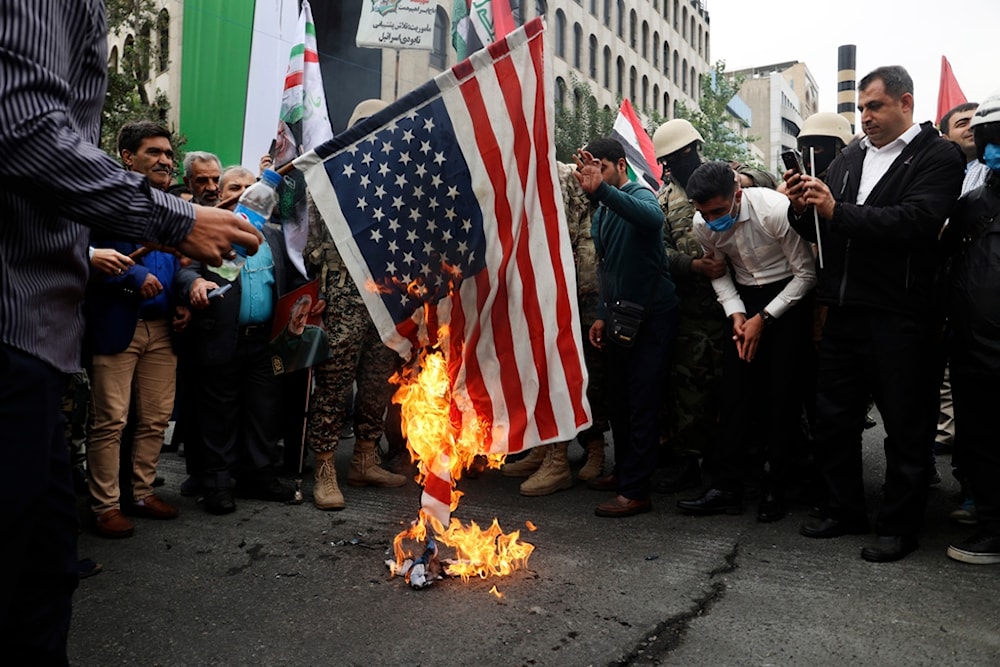Foreign Affairs op-ed says US should withdraw forces from Middle East
An op-ed on Foreign Affairs said Washington should try to promptly withdraw the soldiers it has rushed back into the Middle East and significantly decrease and realign its military position in the region.
-

Iranian worshippers burn a U.S. flag during their pro-Palestinian rally before the Friday prayers in Tehran, Iran, Friday, Oct. 13, 2023 (AP Photo)
An op-ed published for Foreign Affairs on Friday details some of the challenges the US administration is facing as a result of its unwavering support for "Israel" in its genocidal campaign in Gaza.
Having caused immense civilian and infrastructural losses so far, the genocide has triggered region-wide anti-US sentiment of disproportional scale among the Arab masses.
According to writers Jennifer Kavanagh and Frederic Wehrey, the recent surge in attacks on US military personnel in Iraq and Syria is a direct outcome of the Gaza massacre.
Recent reports have indicated that the US has increased its military presence because of this. The US claims that Iran is responsible for the surge of attacks on the US military and thus the military build-up is intended to signal US resolve and deter Iran from alleged plans of expanding the crisis.
The writers say that there may come serious consequences as a result of expanded US military buildup, suggesting that such actions may aggravate regional tensions and inadvertently provoke the conflict the US seeks to avoid.
Read more: Two US bases in Iraq under Resistance fire
There's also a warning about potential entanglement in open-ended security commitments, contradicting the recent trend of US efforts to reduce its presence in the Middle East.
Kavanagh and Wehrey emphasize the need for a course correction in US Middle East policy and advocate for the rapid withdrawal of forces, substantial downsizing, and realignment of the US military presence in the region.
They also suggest investing in the capabilities and resilience of regional partners to enable them to operate more independently with less US support. The goal is to achieve a balanced Middle East policy that avoids overextension while providing reassurance to partners and preventing future crises, they argue.
Here's is the deal
The writers may be right about the fact that anti-US sentiment has grown immensely out of proportion. But if the conflict ends up spilling out to neighboring countries in the region, Iran would not be responsible for it.
As a matter of fact, the US wants to expand the conflict because it's in its best interest to do so. As part of protecting its economic interests and maintaining its imperialist foothold across the world, it would greatly benefit from enforcing measures that would compel rivals to submit to the will of the US.
Intimidation by showcasing it military superiority is one way to do so.
Another thing to consider is the fact that unlike the US, Iran does not have "proxies" in the region, as the authors say, but it rather has allies with whom security agreements are mutually forged.
There is a major difference to consider with regard to this: a proxy does not equate to an ally. While US has proxies in the Middle East, Iran has allies. The nature of that relation is determined relatively to the economic interests that underlie security commitments.
A geopolitical proxy refers to a nation or entity that operates on behalf of another country to advance its strategic objectives, often undertaking actions or interventions that align with the interests of the sponsoring nation.
In contrast, an ally signifies a collaborative and mutually supportive association between two nations. Allies collaborate on the basis of shared political, economic, or security interests, participating in diplomatic, military, or economic cooperation.
Read more: USA: The most hated country in the world

 4 Min Read
4 Min Read








